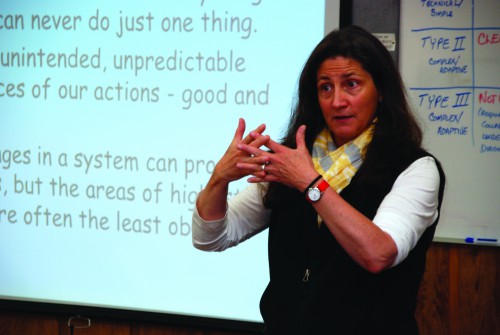Advanced Physician Leadership Program
Thirty-three physicians graduate from APLP armed with new strategies to lead and transform systems of care
by Chet Seward, senior director, Division of Health Care Policy
Thirty-three physicians from across Colorado stepped up to commit to a yearlong leadership-training program through the Advanced Physician Leadership Program (APLP) to attain the tools and skills to have an impact on how health care should work for physicians and their patients. The APLP Class of 2015 graduated in March, armed with new strategies to effectively lead and transform systems of care.
The objectives of the program are to strengthen the ability of physicians to assume leadership roles within the profession and their communities, and to nurture a group of Colorado physician leaders who are trained, willing and confidently able to serve as champions to improve the delivery of cost-effective, high quality and safe care.
They achieved these objectives through four weekend sessions featuring expert training from the Regional Institute for Health and Environmental Leadership (RIHEL) on collaborative leadership, teamwork, negotiation, systems thinking and emotional intelligence; coaching for leadership growth and advocacy; group projects to apply and test new and existing leadership skills; and networking with other physicians and organizations.

Kathy Kennedy, professor of preventive medicine and director of RIHEL, teaches a session during the 2014-2015 APLP.
“Leadership is not just about the individual person,” said Kathy Kennedy, DrPH, professor of preventive medicine and director of RIHEL. “If no other people are affected, then it’s not leadership. The curriculum in the leadership institute is all about increasing self-knowledge, developing self-awareness, understanding the things you do as a leader that are working, what you can do more of, and what you want to lead to change.”
Some of the group projects are community oriented and some focus on health systems issues. “Where people choose to lead is totally up to them; they have to follow their own passions,” Kennedy said.
Dulcy Wolverton, MD, applied for the program because she recognized there were a number of issues she wanted to fix in her professional setting but felt her leadership style wasn’t very effective. She said she tended to be pedantic and make demands to achieve change. “You go through a whole lot of inventory to find out what kind of person you are. I’m an introvert; I’m not very good at being outgoing or at touchy-feely networking and politicking. That’s just not my style.”
“Part of the program was identifying my skills and how my style can interfere with what I want to do,” Wolverton continued. “Because I now know what I was doing wrong, I have tools to better work in a team to get buy-in from the team so that they work toward the goals that I want to achieve. That’s so much more effective. It’s definitely a work in progress and I have a lot more to learn but it’s a great exposure to the ideas that I never learned in medical school.”
APLP’s most important measures of impact are in confidence, willingness to lead and optimism that a physician will be effective in leading, Kennedy said, and confidence is the mechanism that grows for most people, even in those who arrive feeling confident.
New for the second cohort was the implementation of peer coaches. Participants were asked to have a conversation with a peer coach – which includes non-physician professionals – at least once a month while they were in the program. That ensured accountability and continued progress.
“Physicians hold implicit positions and voices of authority in our society, and concentrated efforts to harness and leverage physician leadership have repeatedly been shown to have profound effects on pressing public policy issues,” Kennedy said. “APLP is proud to assist these physicians in continuing the profession’s long history of advocating for the patients and communities they serve.”
The program is coordinated through the Colorado Medical Society Foundation with RIHEL. The Colorado Health Foundation, the Physicians Foundation, COPIC and the Colorado Medical Society generously provided funding for this cohort. Planning for the next cohort is underway. Watch for more information.
Posted in: Colorado Medicine

Comments
Please sign in to view or post comments.